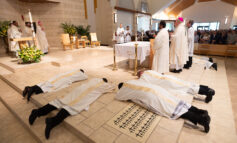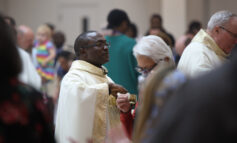By Father John Bayer
Special to The Texas Catholic
In a culture so saturated with sexuality as our own, among the most provocative lines of the Gospel is surely the following: some “have renounced marriage for the sake of the kingdom of heaven” (19:12).
Yes, God calls some men and women to be celibate. This seems so odd to many people, partly because our culture tries loudly to insist that happiness cannot be found apart from unbridled sexual expression.
Even in the Catholic Church, or in a community that cherishes the natural expression of our sexuality in marriage, there are some who are provoked by celibacy. Some think it is an obstacle to priests and their efforts to understand family life. Some feel it even communicates an implicit denial of the dignity of marriage.
Celibacy is a big topic, but I’d like to share a thought about it, one reason why I think it is an important gift in the Catholic Church.
Someone was once trying to explain to me the feelings he had for a girl he dated in college, and he went back to a night they spent together waiting for the sun to rise. She was about to leave to study abroad, and he was terribly sad about it. He says that he enjoyed every minute of that night despite the immanence of its end. It was a time that he wished would “stand still” or a moment he wished “would never end.”
I’m not married, but I imagine that marriage involves such moments: the first embrace after becoming engaged; the wedding night or honeymoon; the first time a couple sits contemplating their newborn child together; an anniversary. These are moments, I imagine, when time seems to “stand still” and when we wish that it really would. For these moments, we can happily allow our horizon to narrow to the measure of our present experience. Nothing else seems to matter. And we are happy.
As a celibate, I don’t think I have experienced a moment quite like that. My solemn vows to monastic life and ordination to the priesthood were wonderful, but I didn’t wish they would last forever. In fact, every moment of my life feels unfinished. I don’t think I want time to stand still. I feel constantly in expectation.
Part of the beauty of marriage, I think, is the promise of satisfaction and completeness. Part of its difficulty, I think, is the inevitable realization that on its own terms marriage cannot deliver on its promises. The honeymoon ends and eventually the thought “This is it?” emerges. We find ourselves in expectation.
I think this is healthy, and at this point the complementarity between celibacy and marriage emerges. In the Church, marriage exalts the depth of our present, the real possibility of tasting love in this world; and yet the celibate reminds us to stay hungry, to look to the future. Our citizenship is in heaven. It prophetically checks any temptation to idolize our glorious present, since it reminds us that the coherence of our lives is set within a wider, transcendent horizon. This does not threaten the joys of marriage. On the contrary, I think this prophetic reminder allows marriage to run freely into its delight.
For if the temptation to idolatry is checked, couples can enjoy the moment without fear of setting themselves up for disappointment. The more unreasonable our expectations of marriage, the greater our disappointment is when we encounter difficulties. The wiser we are in our euphoric moments, the more we sense that the coherence of marriage rests upon the one who transcends it, God, who alone guarantees our happiness (cf. Ephesians 5:31-32). In this way, we do not burden or spouse with filling a role that only God can. We are at peace with our pilgrim existence and more courageous in our search for happiness.
Keeping our horizon expanded protects marriage. Idolatry always ends in destruction. Idols disappoint, and in our bitter humiliation we destroy them.
One last thought. Celibates can also remind spouses that they were free when they entered into marriage. As human beings, we need not be compelled by biology or passion to marry; uniting with someone is a free and rational and so spiritual act. And that means that true love is possible, for we do not strictly speaking “need” each other. We are free to give ourselves away to each other; we are able truly to love each other. Marriage rests not on the passing of chemicals or circumstance, but on the rock of love.
Father John Bayer, O.Cist., is a theologian and monk at the Cistercian Abbey of Our Lady of Dallas in Irving. His column appears occasionally in The Texas Catholic.



